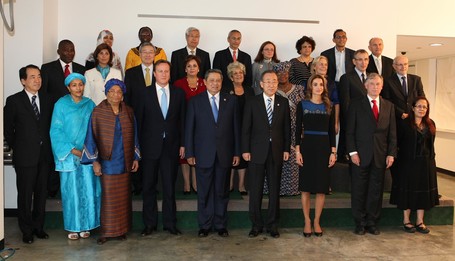
At the First formal meeting of the High Level Panel of Eminent Persons for the Post 2015 Process members of the Panel insisted in ensuring an open process involving all stakeholders and guaranteeing that cohesion among all the processes that are currently going on.
The UCLG President, Kadir Topbas proposed the creation of a sub-group on sustainable urbanization to ensure that this dimension was properly taken into account in the report of the Panel.
After the meeting he stated to journalists that this important task was one that we should all face together. As President of UCLG and Chair of UNACLA he is committed to ensuring that the diversity of local and regional governments, their experiences and solutions are found back in the future development agenda.
As direct inheritor of the First World Assembly of Cities and Local Authorities held at the occasion of Habitat II, UCLG´s leadership is firmly committed to facilitating this inclusive dialogue towards Post 2015 and Habitat III in close cooperation with UN-Habitat.
Towards a new global agenda
“The agenda should be rooted in the needs of the people and communities. The success of our recommendations will be assured if we develop a sense of ownership and accountability at all levels, international, national and sub-national-local levels”, he said.
Dr. Kadir Topbas also added that the future global agenda should be applicable to both developing and developed countries. It should further promote a high degree of policy coherence at the global, national but also sub-national levels; define shared responsibilities and a more balanced approach among all levels of government, local stakeholders and development partners. It is this broad involvement of all stakeholders and a strong anchor on community needs that will make us successful.
The UCLG President made a call for immediate actions that would help maintain momentum to meet the MDGs: “The world has change over the last 15 years since the MDGs where defined. Despite strong efforts and the effectiveness of MDGs, the pace in progress towards poverty eradication has been slow and uneven. Multiple and intertwined crises have emerged coexisting against an unsustainable depletion of the world’s natural resource base. Over 70% of the world’s poor live now in middle income countries, and increasing percentage in cities. The traditional rural-urban patterns are changing drastically”, he added.
Dr. Topbas emphasized the role of local governments in the provision of basic services, that are central to the reduction of poverty and disease. Indeed, the achievement of many of the MDGs’ goals and targets depends on local governments and the support they receive from higher levels of government, international agencies and their capacity to build strong partnerships with civil society and private sector. A strong call was made to support the implementation at local level to accelerate MDGs implementation, strengthening the role of Local Governments and building strong local coalitions including all stakeholders could make the difference in the next three years.
A fundamental revision
President Topbas pointed out the key gaps in the current MDG framework and priority new challenges for the development framework. “The MDGs agenda does not sufficiently address who and how should be acting to achieve the goals. This is something that the new agenda needs to address”
“There is a further a need for a fundamental revision of the global partnership: the institutional and financial framework that should underpin the goals and targets. The new framework should be supported by a stronger and more democratic international governance structure that includes new stakeholders and covers issues and regulations not being addressed at present.”
The UCLG President concluded with the need of identifying new factors that should get greater relevance, such as urbanization, climate change adaptation and access to new technologies. Some of the solutions reduce patterns of energies consumption; disaster risk reduction and comprehensive planning require adapted local strategies and more integrated territorial approach with appropriate involvement from all levels of government. “A large part of this discussion should focus on financial institutions that can support governments (at all levels) that have the responsibility of addressing needs and managing local development”, he ended.
The Panel members also met with the civil society and other stakeholders during a special event hosted by the Government of Japan. Participants stressed that the credibility of the international community and of the UN in particular were at risk. A young activist from Sierra Leone representing future generations called nations to keep whatever promises were made and to remember that this agenda no matter how abstract it might seem is an agenda with human stories behind.
The Minister of Foreign Affairs of Sweden emphasised the importance of ensuring good governance at all levels and acknowledged the growing responsibilities that local leaders had in an urbanising world.










